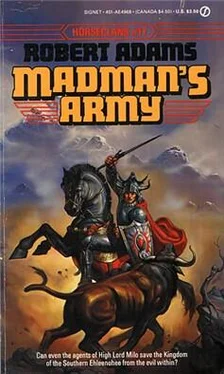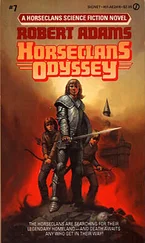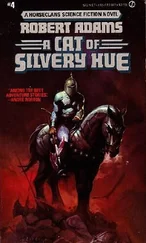“However, as the fleets got larger and more numerous, not just Greek but Italian, Sicilian, Turkish, Syrian, Spanish, southern French and others too numerous to recount, we too often found ourselves fighting each other, bleeding and dying and losing ships to no real account or gain. The field was becoming overcrowded, you see, friend Milo. That was when the great idea occurred to me.
“Following actual years of careful plannings and negotiations, I was able to organize a relatively peaceful meeting of all the leaders of all the larger fleets of Mediterranean pirates and shore-raiders. So successful in many ways were our parleys that some began to take to heart my contention that were they to not all die by way of bloody violence and find as their only grave the belly of some sea-beast, then they had best find arable land somewhere, that they could hold and which would easily nurture them and their get.
“All knew that such was simply not available in most of the seacoast Mediterranean lands, and what little still was would be so hotly defended by present inhabitants as to demand a cost far greater than any possible gain, could it be taken at all. So I told them of the vast, almost-empty spaces of the sparsely inhabited North America that I recalled from before I had sailed back to Europe. I spoke of the fertility of the earth there, of the rich ruins to be stripped, of the thick forests, the abundance of clear water, the sad, huddled, all but helpless knots of survivors, the plentitudes of wild and feral beasts to be eaten and skinned or captured and retamed to the uses of man.
“Two decades of my sermons they heard, and following two deadly calamities that struck almost as one—a very powerful man ascended to the sultancy of the Turks and began to not only put down pirates with his numerous and intrepid fleet, but actually to mount bloody seaborne raids on the bases of the raiders, then a succession of terrible earthquakes and resultant tsunamis devastated the Peloponnese, Crete and many other islands—a large percentage of the sea-robbers of Greece, southern Italy, Syria, Sicily and even far-off Spain made indication that they would favorably consider setting sail across the ocean to a new land where the Turks could not so easily hunt them out.”
Milo just stared. “You ? It is you who was responsible for the conquest of most of the East Coast by the ancestors of the Ehleenohee, Clarence?”
Bookerman-Laskos shrugged, self-deprecatingly. “It wasn’t all that easy, Milo. Ships that were fine for sailing or rowing on the tideless Mediterranean would never have made it across the Atlantic, and I knew this fact even if others did not know it or think of it. I had all of the bases moved from Crete and Cyprus, Sicily and Malta, Sardinia and Corsica and the Balearics to a single point, a huge, sprawling base, on the coast of Portugal, a bit south of the vast ruins of Lisbon. We were compelled to conquer the people of that land in a succession of wars. Only then could we go about utilizing their labor, their wood and their shipyards to build for us an oceangoing fleet.
“I like to think that we were good rulers and protectors of the people, Milo. We drove off countless raids by sea-rovers, defeated utterly two in-force raiding fleets of Moors and one of Basques. In answer to repeated provocations, we sailed up to Bilbao, scuttled or burnt all of their ships and even boats, went ashore and defeated their forces, then looted and fired the town that squatted among the ancient ruins. No, I had forgotten, we did not destroy all of their ships; those that looked usable to our purposes, we sailed or towed back to our base to add to our burgeoning flotilla, and, having learned from this episode, we began to do the same to other Atlantic-coast Spanish, French, English, Irish and other ports. We carefully scouted out objectives, struck with overpowering forces, fought hard, but then most often sailed away with only usable ships and easily come-by bits of loot, ships’ stores and perhaps a few new women.
“Even so, doing the best that we could, doing it as carefully but still as fast as we could, it took us the best part of eight years to make ready for the great adventure. Using ancient maps and charts, I laid out our course for North America, and, late in August of that year, we set sail out of our jam-packed harbor— nearly twelve thousand men aboard seventy-eight ships, leaving almost as many men to follow in a second wave whenever enough bottoms were built or taken from others to bear them. And even as we sailed out into the Atlantic, more of our kind were sailing in from the Mediterranean, fleeing the wrath of the savage Turks.
“The voyage, unlike my terrifying solitary one two centuries past, was relatively easy and almost serene. We did not begin to lose ships until we had sailed into the coastal waters and begun to run up against unmarked shoals and other dangers that were not, of course, shown on the two-hundred-year-old charts. But, recall, please, Milo, this all occurred more than two and a half centuries prior to that horrible spate of seismic disturbances, volcanism, tsunamis and land subsidences, so the coast was basically unchanged, with few swamps worthy of the name along them, so landings were effected with a fair degree of ease and we began to acquire a few mounts and send out some parties of scouts to see what lay before us and allow us to carefully choose initial objectives, for it was plain that the lands were not deserted as I had recalled them from so long in the past, but that certain numbers of folk were living on them, exploiting them in various ways.
“We had landed on the Atlantic coast of that area once known as the State of Georgia. There were many ruined places, yes, but there were also quite a few agricultural settlements, two of these large enough to be considered small cities, by then-current Mediterranean standards, and these were called Savannah and Brunswick. We knew that both must fall quickly were we to gain uncontested possession of the rich croplands between them; also, we needed harborage for our fleet, lest the autumnal and winter storms wreck it.
“I decided to first attack the larger, stronger of these little cities. I personally reconnoitered, lying hidden and still in many places for days, but finally emerging with a sound plan of action.
“With the weapons and equipment then available to us, Savannah sat impregnable atop its bluff, impregnable by river, that is. But still I sent elements of the fleet up the river, where they created a noisy disturbance just beyond the ranges of the defensive engines mounted atop the bluffs. All but a handful of the foolish, painfully naive Savannanans rushed to the walls atop the bluffs, and that was when I led my men against the landward walls. We swarmed up them on our assault-ladders, flung open the gates and let the rest of our men in to begin a bloody massacre of the inhabitants. Understand, Milo, I did try to control my men, but a single man cannot be everywhere at the one time, you see. Some few escaped the city, naturally, such things happen in warfare, so we well knew that the other city, to the south, Brunswick, would be warned and very watchful.
“The river harbor below Savannah was roomy enough for our fleethaven for the season of storms, so we moored the most of the ships therein and let Brunswick wait and watch and worry while we spent the autumn and winter and early spring in consolidating our gains and moving by both land and water against the smaller centers between us and the other city. I had managed to convince my bloodthirsty minions that live slaves were far to be preferred to decomposing bodies, so we oversaw our new-won lands planted in the spring, then the most of us marched off southward and westward to win more land and slaves and loot.
“With all of the countrysides surrounding it in our hands and all of its vessels sunk or driven off sea and river, besieged Brunswick fell to our arms a year almost to the day after Savannah had fallen. Therefore, with a firm foothold established on that coast, I took four ships and set sail back to the east to fetch back the second wave of Mediterraneans to conquer yet another part of the lands.
Читать дальше












